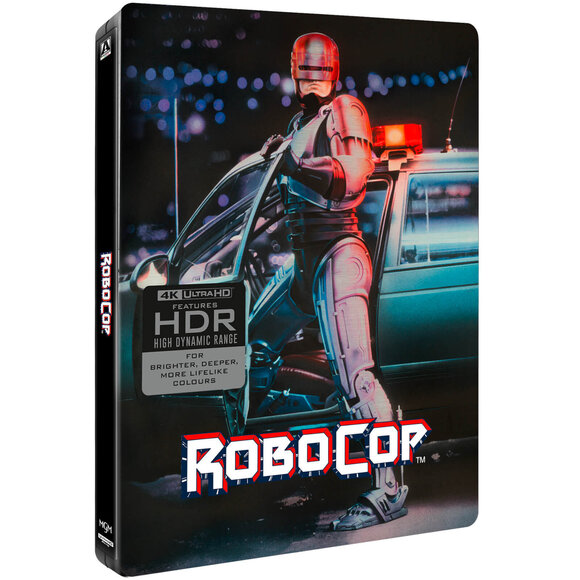
When it came out in 1987, RoboCop (dir. Paul Verhoeven) was one of my favorite movies. I was seven. I loved superhero flicks and monster movies. And as a superhero-monster movie, RoboCop was also funny. Few films co-exist well as both a satire and a bleak, violent shoot-’em-up. RoboCop is in that minority, mainly because Verhoeven revels in the grime and the sleaze, in the over-the-top absurdity. He plays into these elements; he’s not above them.
Detroit, in the not-too distant future: crime is rampant, and the police are getting slaughtered. To address the situation, OCP, a corporation that has taken over the police force, makes a mechanical cop—ED 209 (a marvel of stop-motion animation; I love its glitchy jitters). But ED 209 malfunctions, badly, and its cutthroat chief architect, Dick Jones (Ronny Cox), has blood on his hands. Seizing an opportunity to outshine him is Bob Morton (Miguel Ferrer), his rival in the office. A hotshot, Bob’s convinced that a half-human/half-robot cop is the best play OCP has.
Enter Murphy (Peter Weller), a good cop who just transferred in from another precinct. Whose first day on his new beat with a different partner, Lewis (Nancy Allen), ends tragically when a nasty band of thugs led by Clarence Boddicker (Kurtwood Smith) blasts him into Swiss cheese. Morton turns Murphy (not dead, but not quite alive) into RoboCop, a literal human machine with a badge of honor. Ego-free. Neutered but incorruptible.
RoboCop’s initial forays into battling crime go well—too well. Jones goes after Morton, then RoboCop. And Jones is tight with the Boddicker crew. Real tight. However, RoboCop starts to remember them, and he starts to recall the family and the life he lost. Still, he’s an OCP product—forbidden from jailing his master—and by the time he sees the writing on the wall, OCP sics the police on him. Broken down and busted, RoboCop is toast.
Or is he?
Weller is magnificent in the lead role. In a suit designed by special effects maestro Rob Bottin, he carries the illusion. He strides with a fluid, robotic grace; his movements are stiff yet measured, his voice stern, almost blank. When RoboCop unpacks what happened to him, the actor conveys subtle hints of vulnerability. The ghosts of the past haunt this man machine.
As a lead-footed contraption all its own, the movie goes for ultraviolent gold. Scenes of carnage are meant to be explicit, to shock us into understanding the brutality of this urban wilderness. Verhoeven wastes no time setting things up. He doesn’t dwell on the gore, either. The movie hurtles by, and its mordant sense of humor invites us into the story, lightening the mood with mock commercials and snippets from a fake news broadcast. These elements boost the world-building exposition needed to hook us. And not only are they good for comic relief (in a film that already doesn’t take itself seriously, and which maintains a darkly camp tone), they keep to the film’s playful poke at dehumanization and our collective need to buy crap that feeds our fetish for violence and speed. (The 6000 SUX! The car of the future!)
The movie, though, has heart, and that’s what keeps us in the picture. There’s an emotional core to RoboCop’s plight. He’s a sympathetic being—a far more likable and relatable man than any of the other male egos on screen. (If nothing else, the movie’s a takedown on self-absorbed weenies and the world they’d like to run.) There’s something mythic about him. He’s a machine who seeks to understand how he came to be, who becomes truly heroic once he stops following protocol and undertakes to cleanse the system that made him. That same dark, God-like force that won’t relinquish control, that’s too big to never not be his master. I credit Weller, of course, with helping to bring this off, and I credit the brilliant script by Edward Neumeier and Michael Miner.
But Verhoeven wins the movie. It was his first American film, and it’s still his best Hollywood outing. There’s an exploitative zeal to his direction here, a cheeky, heightened sense of play that embraces the sensationalism it sends up. A movie like this needs that tone, that energy—a cold, wicked eye to paint a crude dystopia in broad, desaturated strokes, that doesn’t confuse subtlety for wit. Verhoeven orchestrates everything to the same mad pitch. He’s in on the joke, but he’s savvy enough to know better. The audience for this movie wants to be emotionally engaged even as it savors the satire. And he delivers (1).
This gets at why RoboCop endures (for me, anyway). It’s pure pop entertainment made by genre-loving intellectuals who see the inherent emotional power in trash.
The limited-edition Arrow Video 4K UHD steelbook is a sleek thing of beauty. Besides a 44-page booklet, the set contains two discs. One includes the director’s cut of the film. (You get extra seconds of gore in the ED 209 intro and the Murphy massacre.) Arrow ladles the disc with audio commentaries, cast and crew interviews, deleted scenes, and image galleries. Disc two centers on the theatrical cut. This disc includes separate audio commentaries and the TV edit of the film, along with split-screen comparisons of the director’s cut and the theatrical version. The Arrow steelbook is definitive. Given the sharpness of the 4K restoration and the exhaustive list of features, it should please any devotee of the film.
(1) The movie was a hit, spawning two sequels, two live-action TV series, an animated TV series, and a 2014 cinematic reboot. None of them top the iconic original.